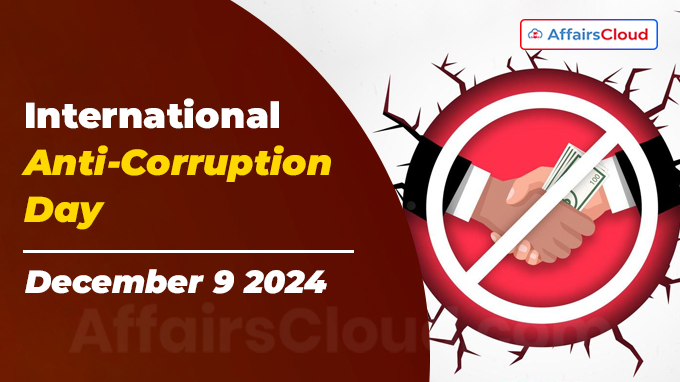 The United Nations (UN)’s International Anti-Corruption Day (IACD) is annually observed across the globe on 9th December to spread awareness about the negative impacts of corruption and the role of the UN Convention on combating and preventing corruption.
The United Nations (UN)’s International Anti-Corruption Day (IACD) is annually observed across the globe on 9th December to spread awareness about the negative impacts of corruption and the role of the UN Convention on combating and preventing corruption.
- The day highlights the role of everyone including, Individuals, non-governmental organizations (NGO), law enforcement and media persons in tackling the issues of corruption.
Theme:
The theme of IACD 2024 is “Uniting with Youth Against Corruption: Shaping Tomorrow’s Integrity”.
Note: With 1.9 billion young people in the world, fighting corruption is vital for the future of nearly a quarter of the global population.
Background:
i.On 31 October 2003, the United Nations General Assembly(UNGA) adopted the United Nations Convention against Corruption and requested that the Secretary-General designate the United Nations Office on Drugs and Crime (UNODC) as the secretariat for the Convention’s Conference of States Parties (resolution 58/4).
ii.The UNGA also designated 9 December as IACD, to raise awareness of corruption and of the role of the Convention in combating and preventing it.
iii.The Convention entered into force in December 2005. Since then, 190 parties have committed to the Convention’s anti-corruption obligations, showing near-universal recognition of the importance of good governance, accountability, and political commitment.
- On May 9, 2011, India ratified the United Nations Convention against Corruption (UNCAC).
iv.The Pledge of the day: “Commits to integrity, rejecting corruption and promoting transparency”.
v.The slogan “Your NO Counts” emphasizes individual responsibility in fighting corruption.
India’s Corruption Perceptions Index:
In 2023, India ranked 93 out of 180 countries on the Global Corruption Perception Index, emphasizing the urgent need for stronger policies and improved accountability to combat corruption.
Anti- Corruption Laws and Policies in India:
- Prevention of Corruption Act, 1988: Defines corruption and imposes penalties on public servants and bribe givers.
- Bharatiya Nyaya Sanhita, 2023: Replaces the Indian Penal Code(IPC), 1860, modernizing provisions related to corruption and bribery.
- Lokpal and Lokayuktas Act, 2013: Addresses grievances related to corruption and ensures public accountability.
- Whistleblowers Protection Act, 2014: Promotes transparency by protecting individuals who report corrupt practices.
- Prevention of Money Laundering Act, 2002: Targets money laundering and related financial crimes.
- Benami Transactions Act, 1988: Prohibits benami (proxy) transactions to combat illicit wealth.
- Black Money and Tax Imposition Act, 2015: Aims to curb black money and impose taxes on undisclosed assets.
Anti- Corruption Policies for Enforcement Mechanisms:
- Central Vigilance Commission (CVC): Supervises anti-corruption measures and investigations to promote transparency in government departments.
- Central Bureau of Investigation (CBI): Handles high profile corruption cases at the national level.
- State Anti-Corruption Bureaus: Investigates corruption cases at the state level, ensuring accountability among state officials.
2024 Events:
The 2024 IACD event featured two key panels:
i.Young People as Integrity Builders: Exploring successes and lessons from youth engagement in promoting integrity and education.
ii.Shaping Tomorrow’s Integrity in Conflict Settings: Discussing youth’s role in combating corruption in conflict-affected regions.
Other Events:
The Conference of the States Parties to the United Nations Convention against Corruption (CoSP11) will be held from December 14 to 19, 2025 in Doha, Qatar.
- The 2024 International Anti-Corruption Conference (IACC) will host debates and collaborative actions across 7 thematic tracks.
About United Nations Office on Drugs and Crime (UNODC):
Director General(DG)- Ghada Fathi Waly(Egypt)
Headquarters- Vienna, Austria
Established-1997




